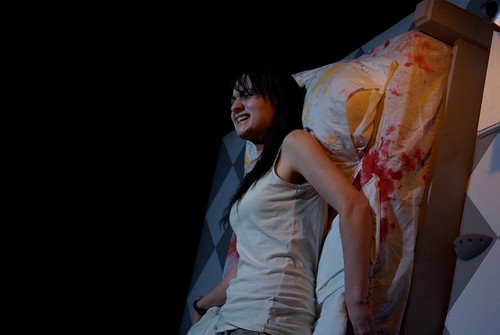Thanks to Takeover Festival, and its associated abundance of free tickets, I recently became more aware of what I think is one of the greatest distinguishers between live performances and the static, usually pre-recorded, "modern"media of television, film and radio. This was the first time I had been to see a show twice, revisiting 4:48 Psychosis on the third night, and catching both the matinee and evening performance of Belt Up's magnificent The Beggar's Opera. The stark differences between each showing were so significant, it is hard to underestimate the unique quality of each performance, and the weight an audience commands in determining this.
I had expected quite a different audience for The Beggar's Opera matinee. In truth there were no more than fifty in house, with just a handful of those falling under, say, 65 years of age. And many came expecting a beautifully classic version of John Gay's comic opera. Needless to say they found themselves challenged. The level of expletive usage was critically high for such an audience, and we quickly felt the tension rising from the stalls. The lady behind accosted us in the interval insisting "That was not the Beggar's Opera". Not a promising first half.
Things did, however, improve in the second half. Those who chose to remain (after 12 interval walk-outs) were swept along with the enforced jollity of Belt Up's performance. And there was a decent applause, as much as could be expected from such a small audience. All of this did nothing to prepare me for the onslaught of the evening performance. A pretty good turnout, with a mix of young and old, immediately provided an upbeat atmosphere, something which would build and build right to the exuberant finale. The contrast in the feel of the show is impossible to understate. Those exiting the matinee trickled away almost sheepishly, but later the same day I was hard pushed to see anyone leaving without a large grin on their face.
Psychosis provided a very different comparison experience. The first night performance was fresh and raw, not perfect, but more powerful as a result of this naivety. But the third night was very different, quite surreal. The whole play took on a kind of black comic element, becoming almost a parody of Kane's original. The culprit in my opinion was one man who began to laugh at the more shocking expletive lines. The rest of the audience seemed to get swept along with this tension diffusing humour. What was a brutal, shocking performance had been transformed into a mildly disturbing piece on mental health with darkly comic undertones.
This prompted me to reflect on the unique nature of live performances. We rarely see theatre twice; perhaps every performance is significantly different. The role of the audience seems critical. The feel of a play depends very much on how it is received by those watching. Being in the audience always seems such a passive experience, but in actuality viewers contribute a critical part to any performance. How people react, whether they laugh, yawn, or remain indifferent, creates the atmosphere in the auditorium, an atmosphere which influences the actors on stage, the mood of the audience, and our overall impression of the show. It seems the success of a show is for the most part in the hands of the audience, after the work of the production team and actors has been done. We must remember that it is thanks to both the audience and those creating the show that each theatrical performance becomes a unique experience, in a way that prerecorded or replayed film, television and radio pieces can never be.





